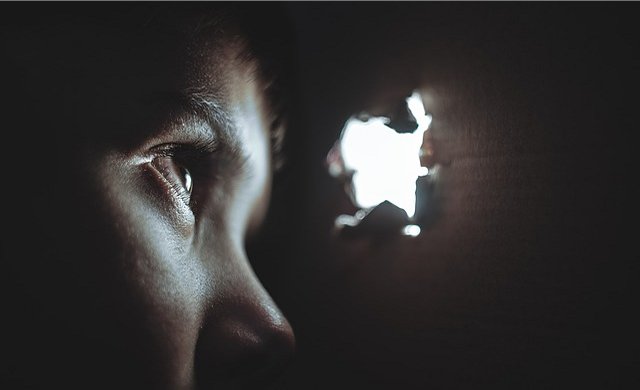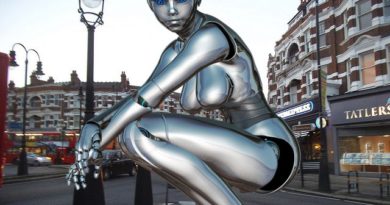The Fair Heavens
The night was a roar of crickets and a blaze of stars. The clouds had cleared, and a sliver of moon crowned the sky with a sharp smile. Our small procession skirted the edge of a field where the corn was halfway grown, the dark, floppy silhouettes of their stalks stretching out as far as I could see. Levi, John, and Miriam carried candle lanterns like time-travelers, yet somehow they moved easily by their weak glow. Ballard was the only one with a flashlight, and he stumbled along with me at his side, equally as off-balance. Somewhere behind us, I heard a horse whinny and stamp its hooves. I turned back and saw a single, lighted window in the big, Amish house. Martha had stayed behind with Samuel and Abram so we could move unencumbered during our nighttime hike. I could see the old woman’s shadow behind the thin curtain, motionless. She was at prayer.
Ahead of me, I watched the lanterns bob and waver in the dark. The professor’s light darted restlessly across the ground. He was irritated, and I heard him sigh more than once. I watched him kick a rock that nearly tripped him, and it went flying through the air until it smacked into a tree trunk with a crack. That’s when I saw the tree itself, a lanky poplar that for some reason, looked blue. I blinked and adjusted my glasses.
And then, Levi cried out for God.
There was a burst of light that seemed to come from nowhere at all, materializing in the sky like a miracle. It moved silently and swiftly behind the dense screen of trees ahead, exactly where the Beilers had seen it two evenings ago. Before I could blink, before I could process it, we were running — a jumble of tiny lights in the blackness. Miriam was yelling, crying for Ruth. John called her name, too. Maybe even I did. I was terrified and excited and filled with shock and hope. Perhaps that’s what wonder is.
Ballard said nothing, but I heard his short, quick breaths in between footfalls before he dashed ahead of me. He was all speed and determination, undoubtedly believing his mission trumped even that of the traumatized family that screamed for their little girl. I caught Miriam by the elbow as she stumbled, unable to see through the veil of tears that blurred her vision. Together, we plunged into the woods.
I ignored the thorns of a blackberry bush that tore at my hands and pulled at my sweater, emerging in a small clearing of moss and leaves. I paused for a moment and shielded my eyes against a field of vicious, penetrating light. After a moment, with my hand on my forehead, I pushed forward, using the dark outlines of people and trees to aid my navigation. I remember that Ballard had clung to his briefcase, an incongruous, geometric shape amid the undulating forms in the woods. That strange detail became even stranger when I noticed it was totally still, trailing behind him in mid- run.
I suddenly realized my feet were the only ones brushing the ground, my mouth the only one gulping the air. Mine was the only gasp as I saw Miriam in mid-lurch, her face contorted, her hands open, clawing at the light from the ship. Levi and John were also frozen, their hair stiff and eyes wide, stuck in a desperate moment. I alone moved toward the brilliant craft that lingered in the down-sloping field of high grass nearby. I shuddered and whimpered and flailed. Like a novice actor, I didn’t know what to do with my hands. Ultimately, I simply forgot, because I was confronted with a sight so improbable I nearly collapsed. Abram had told us the truth.
I was at the edge of the woods, squinting and sweating and swallowing hard. Something floated — a rag doll, limp and helpless — was suspended in the air, bathed in a beam of red light. It was Ruth, her tiny body outlined against her smock-like dress. Her hair had come loose, and brown curls poked out from the edges of her bonnet that sat untied, on her head. But it wasn’t the dark marvel of antigravity technology, or the sorrowful body of the little victim that horrified me most; it was the sight of two creatures that stood nearby, accompanying Ruth as she was lowered to the ground, unconscious.
They emerged from the glare of the ship with a sinister confidence, their movements stilted but efficient and minimal. Their oversized heads were perched on bone-thin, gray limbs. They picked their way across the uneven ground with the ease of owners, not visitors. More distinct than their improbable anatomy however, was the power of their presence. They seemed to be filled with knowledge, a superiority that commanded fear, demonstrated control, and intimated death.
I threw up. I remember the hot, wet sick clung to my sweater and grew cold in seconds. One of the beings turned toward me, its massive, liquid eyes sucking me into their depths, black as space. The creature was mouthless, void of expression, and yet perfectly clear in its communication. A voice filled my head. It was a warning in the form of a greeting: “Hello, Kara. All is well.”
⊕
Ruth lived, but the Beilers didn’t invite us to speak with her. I never saw them again.
Ballard disappeared two days later, having mercilessly quizzed me about the missing time he experienced and my unshakable description of what I saw during his blank moments. His hand-written note to Miller’s president said he had been given an unspecified post at an Italian university, effective immediately. A colleague working in Rome at the time Ballard was there told me the professor had become inconsolable, drunken, and lewd. He was unemployable in academia and had taken to giving historical tours of the various sites in the ancient capitol. I can hardly imagine Robert entertaining the hoi polloi. Apparently, neither could he. He hung himself in a ramshackle apartment near the Tiber River in 1962.
As for me, I have defied some of the odds my family laid against me: I’m married, successful, and occasionally happy. But I have seen those otherworldly beings many times since that night on the farm: at the foot of my bed; in my son’s nursery; following my car at twilight, the light of their ships flickering in my rear-view mirror. I have lain on their operating tables and felt their cold instruments in me for reasons I can’t fathom and with results that I hope never to know. I have lost hours and minutes of my life, awakening in odd places in various states of undress and pain, unable to remember how I got there. Unable that is, until I’m hypnotized by my therapist. Then, I recall the horrors that my protective mind and my unfeeling captors have attempted to conceal. “Hello Kara,” they say when they intrude into my life, shattering normalcy with a quiet command, “All is well.”
In my spare time, I read paranormal magazines and clip odd stories from newspapers — stories that lurk like footnotes on the neat edge of our consensus reality. I go to bohemian coffee houses to scan bulletin boards, searching for people like me. I have learned that there are more of us than I could have imagined.
It is 1974. I am Dr. Kara Porter — mother, wife, art historian, American, abductee.
Kevin Thomas Conroy writes about all things mysterious, sinister and odd. His short stories have appeared in Cyclamens and Swords, Devolution Z, and twice at Everyday Fiction.com. He lives in Los Angeles.




